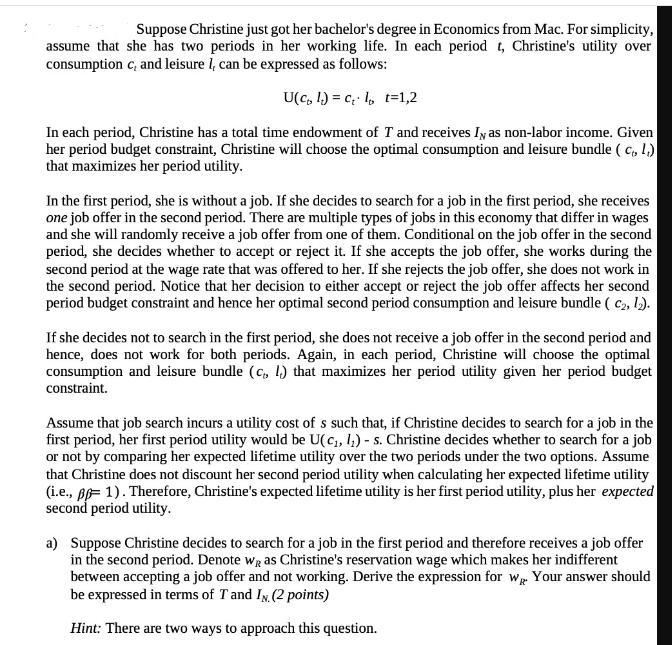Answered step by step
Verified Expert Solution
Question
1 Approved Answer
Suppose Christine just got her bachelor's degree in Economics from Mac. For simplicity, assume that she has two periods in her working life. In

Suppose Christine just got her bachelor's degree in Economics from Mac. For simplicity, assume that she has two periods in her working life. In each period t, Christine's utility over consumption c, and leisure I, can be expressed as follows: U(C, 1) c l t=1,2 In each period, Christine has a total time endowment of T and receives I, as non-labor income. Given her period budget constraint, Christine will choose the optimal consumption and leisure bundle (C, 1) that maximizes her period utility. In the first period, she is without a job. If she decides to search for a job in the first period, she receives one job offer in the second period. There are multiple types of jobs in this economy that differ in wages and she will randomly receive a job offer from one of them. Conditional on the job offer in the second period, she decides whether to accept or reject it. If she accepts the job offer, she works during the second period at the wage rate that was offered to her. If she rejects the job offer, she does not work in the second period. Notice that her decision to either accept or reject the job offer affects her second period budget constraint and hence her optimal second period consumption and leisure bundle (C, 12). If she decides not to search in the first period, she does not receive a job offer in the second period and hence, does not work for both periods. Again, in each period, Christine will choose the optimal consumption and leisure bundle (C, 1) that maximizes her period utility given her period budget constraint. Assume that job search incurs a utility cost of s such that, if Christine decides to search for a job in the first period, her first period utility would be U(C, 1) - s. Christine decides whether to search for a job or not by comparing her expected lifetime utility over the two periods under the two options. Assume that Christine does not discount her second period utility when calculating her expected lifetime utility (i.e., B1). Therefore, Christine's expected lifetime utility is her first period utility, plus her expected second period utility. a) Suppose Christine decides to search for a job in the first period and therefore receives a job offer in the second period. Denote w as Christine's reservation wage which makes her indifferent between accepting a job offer and not working. Derive the expression for W. Your answer should be expressed in terms of T and IN.(2 points) Hint: There are two ways to approach this question.
Step by Step Solution
★★★★★
3.52 Rating (155 Votes )
There are 3 Steps involved in it
Step: 1
Approach 1 To derive the expression for the reservation wage WR that makes Christine indifferent between accepting a job offer and not working we can compare the expected lifetime utility under both o...
Get Instant Access to Expert-Tailored Solutions
See step-by-step solutions with expert insights and AI powered tools for academic success
Step: 2

Step: 3

Ace Your Homework with AI
Get the answers you need in no time with our AI-driven, step-by-step assistance
Get Started


